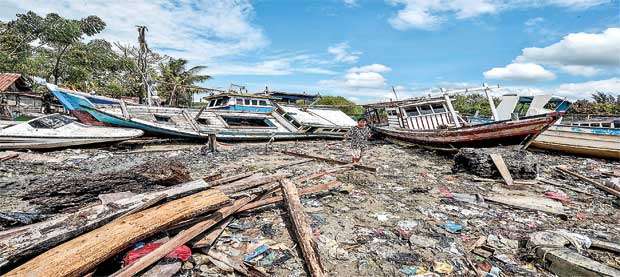28 Dec 2018 - {{hitsCtrl.values.hits}}

Natural disasters hit the poor much harder than they do the better-off, so the poor should have priority when we reconstruct
This past week I’ve been acutely aware of what survivors in Indonesia were experiencing – their bewilderment and agony
In October this year, The Guardian newspaper in the UK carried an article by Sri Lankan academic and author Sonali Deraniyagala on the Sulawesi earthquake and tsunami that struck Indonesia in September 2018, claiming over 2000 lives.
In December 2004, Ms. Deraniyagala lost her family to the Indian Ocean tsunami, which claimed over 35,000 lives in Sri Lanka. The tsunami took away her two young sons, her husband, and her parents. Ms. Deraniyagala survived by clinging to a tree branch. In 2013, she released her award-wining memoir ‘Wave’, which recounts her experiences in the tsunami and the intense grief she felt thereafter. ‘Wave’ is used as a prose passage in the O/Level English Literature syllabus. 
Daily Mirror republishes below the article by Ms. Deraniyagala, which appeared in The Guardian, in memory of the victims and survivors of the 2004 tsunami disaster, and the current tsunami tragedy affecting Indonesia’s Java and Sumatra islands.
“I cannot imagine what happened to you” – people would often remark to me. I lost my world in the Indian Ocean tsunami of 2004. We were on holiday. I survived the deadly wave that struck the South Eastern coast of Sri Lanka. My two young sons, my husband and my parents did not.
“I can’t imagine the horror of it,” I’ve heard people say this week as news of the Sulawesi earthquake and tsunami in Indonesia reached us. We heard about Rori, a 29-year-old woman who fled her home with her husband and baby daughter as the earth shook and the floor split and her mother got swallowed into the moving ground.
We often stop ourselves imagining when confronted by the unthinkable. We do this out of respect, and also fear. We may think it too presumptuous to imagine the suffering of an individual like Rori. We are also afraid. But the truth is, we can imagine. And we need to. Not out of moral obligation, but because, really, none of us is that safe. And accepting this can be life-affirming, not scary. When we see that we are not so different from the people caught up in these calamities, we are not numbed by their stories. We can understand, and help.
This past week I’ve been acutely aware of what survivors in Indonesia were experiencing – their bewilderment and agony. In those early months after the tsunami I was immobilised on a bed, shaking, pain crushing my chest, clueless about what I should do now, how could I possibly live.
How do we recover, as individuals, communities and countries? There is no blueprint for healing and rebuilding. Each situation is unique. But there are common challenges that we can understand, and imagine.
Speed matters, when providing emergency help – food, medicine, safe shelter. Rori’s daughter got a fever soon after the earthquake, she needed treatment – a temperature so high is dangerous for a young child.
Rebuilding infrastructure matters – schools, roads. Devastation provides opportunity to modernise and make buildings safer. But it’s equally important to rebuild usefully and with imagination. This does not always happen. In Sri Lanka, I’ve seen new houses built after the disaster used only for storing rice – people found the tsunami-resistant, dome-shaped new dwellings too bizarre to live in.
Natural disasters hit the poor much harder than they do the better-off, so the poor should have priority when we reconstruct. In Haiti, mortality from the earthquake of 2010 was highest among the urban poor of the capital Port-au-Prince. The loss of assets – farms, livestock, equipment – can be ruinous.
I know too that psychological support is crucial. Some weeks after the tsunami in Sri Lanka, I heard of a man whose children were killed by the wave. His took his own life, throwing himself under a train. With the right psychosocial help, he might have had a chance.
With therapy I learned to tolerate the unbearable, and to process the unthinkable. And I was able to revive.
Survivors in Sulawesi may be forever altered by this horrific geological event that caused the ground we assume to be safely solid to melt and liquefy. But they can recover and re-emerge. They can be happy and productive, and find meaning and joy again.
My sons would have turned 21 and 19 this year. I often imagine how they would now be. Two of their friends from London are in Sri Lanka right now, volunteering on a project that teaches music to rural children who don’t have teachers or instruments. It was started up with donations after the 2004 tsunami. And more than a decade later – when houses have been rebuilt and highways constructed – it endures. It excites young children who thump their drums and blow their trumpets too loud. They are learning new skills. And are learning to imagine.
30 Nov 2024 8 minute ago
30 Nov 2024 3 hours ago
30 Nov 2024 4 hours ago
30 Nov 2024 7 hours ago
30 Nov 2024 9 hours ago